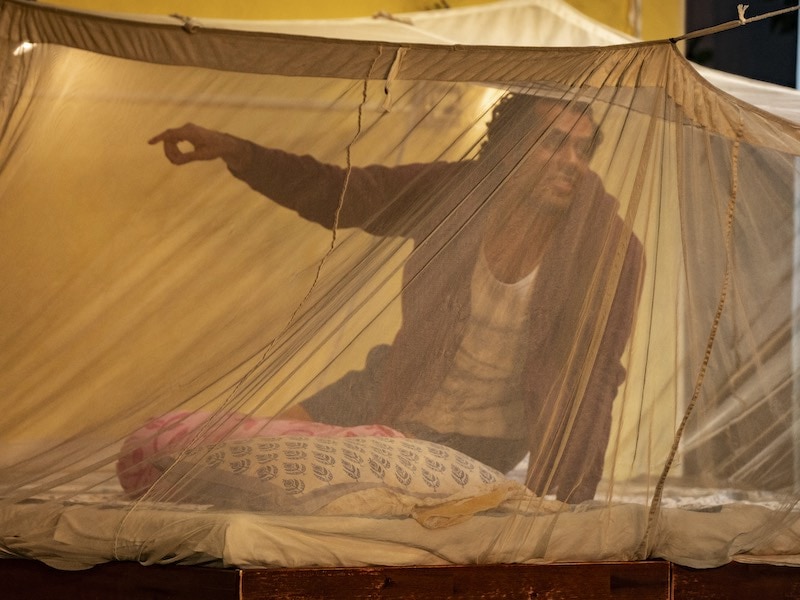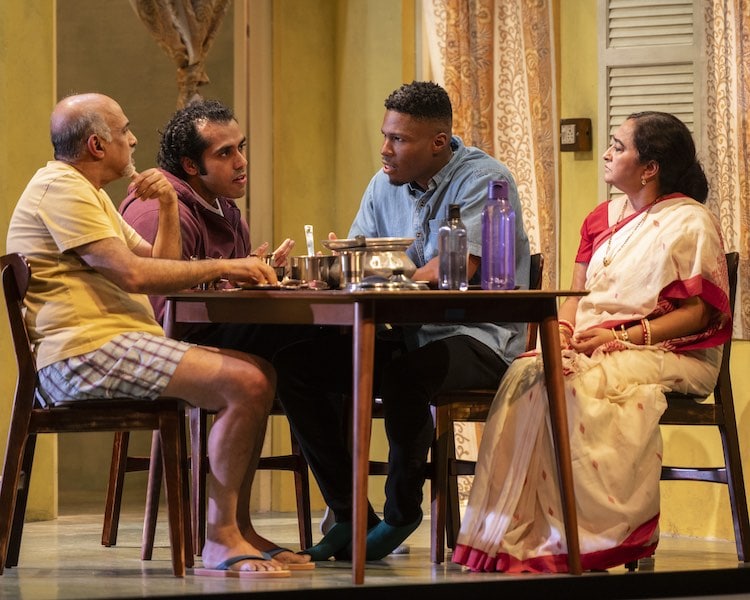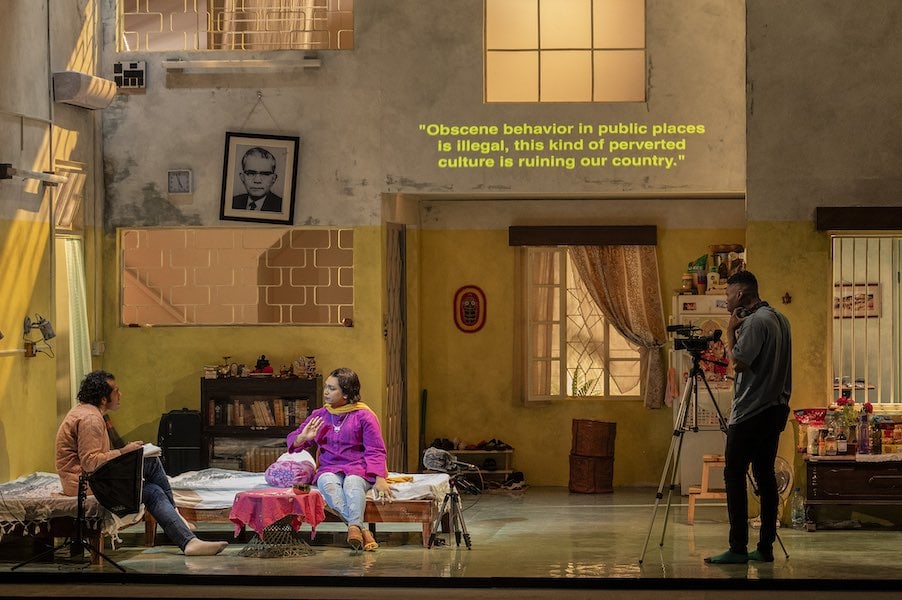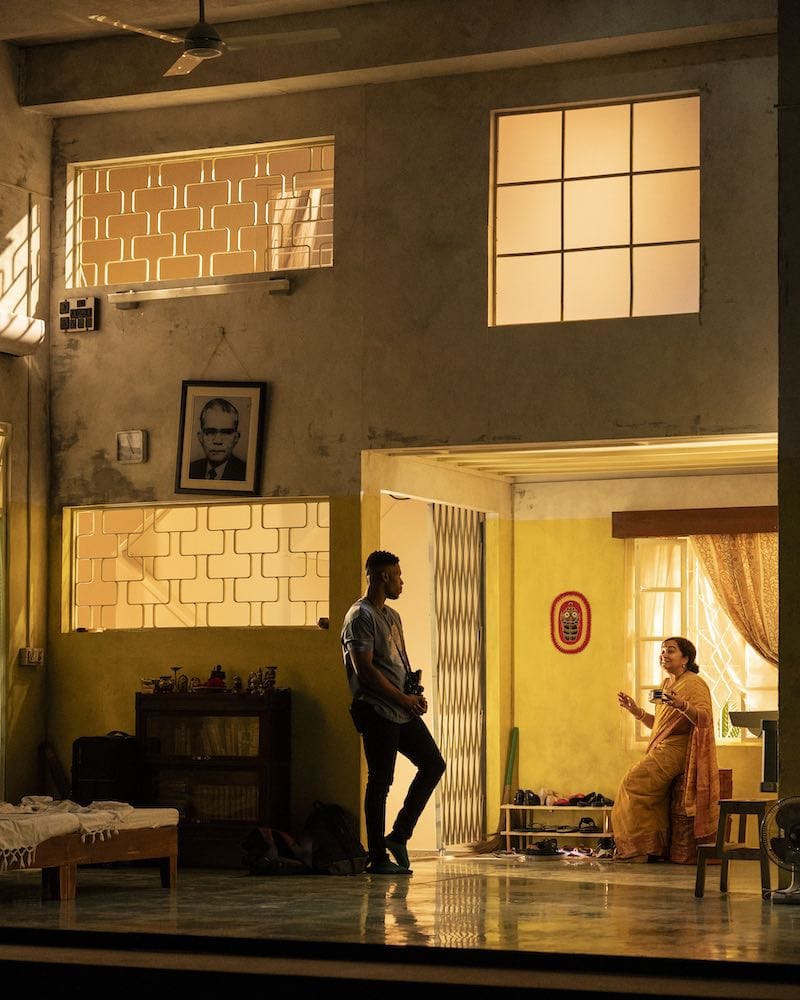Beneath a mosquito net in a dark room in Kolkata, India, the dim glare of an iPhone lights a man’s face as he scrolls through Grindr. Intending to recruit interview subjects for a research project, Choton feels his professional endeavor transcend into something more sensual as he chats with a Bengali stranger who is cruising for sex. This moment of attraction and its resulting sexual revelation is one of many personal breakthroughs that make up Shayok Misha Chowdhury’s Public Obscenities, playing through December 23 in a slow-burning bilingual production at Woolly Mammoth Theatre Company.

Public Obscenities centers on Choton (Abrar Haque), an American-born Bengali who has returned to his family’s home in Kolkata with his Black American videographer boyfriend Raheem in tow (Jakeem Dante Powell) to document the lives of local LGBTQ residents for his Ph.D. project. They stay at the home of Choton’s late grandfather, Dadu, which now belongs to his aunt Pishimoni (Gargi Mukherjee, excellent), her husband Pishe (Debashis Roy Chowdhury), and their live-in servant Jitesh (Golam Sarwar Harun, mostly silent, but soulful). As Choton grapples with his identity and the ripple effects of having grown up under Indian cultural customs in the United States, his grandfather’s stoic, severe portrait looms overhead as a constant reminder of the family’s high expectations he must strive to live up to. But when an antique camera and decades-old roll of film force the family to recognize Dadu’s sensuous side, Choton must also confront his own desires and insecurities, and reconsider his concept of where, or what, “home” really is.

Chowdhury methodically presents his audiences with complex contradictions rooted in cultural traditions, highlighting the limbo that LGBTQ Bengalis may find themselves navigating. But where such personal cultural explorations can risk becoming tedious, Chowdhury trusts the audience enough to avoid focusing too closely on explaining cultural intricacies, allowing the conflicts to arise naturally out of the relationships between characters. For instance, Pishimoni and Pishe are deeply accepting of Choton’s sexuality and relationship with Raheem, but shudder when the unspoken possibility arises that Dadu may have had relationships with men. Shou (Tashnuva Anan, exquisite), a gender nonconforming person who identifies as “Kothi,” is harassed by local police for wearing feminine clothing and carrying an informational pamphlet about HIV, a holdover from imperial British penal code outlawing “lewd behavior.” And perhaps most striking is the humiliating treatment of Jitesh, a live-in servant, by the seemingly progressive family.
Choton’s bicultural upbringing also adds an extra layer to examining experiences common in queer people. Among these is the desire to find community, in person or online, with those like oneself, and the toll of body dysmorphia many gay men experience following feelings of emasculation while in the closet. In a poignant exchange, Choton recounts his father’s elaborate ritual of avoiding nakedness in the locker room at a public swimming pool, making him internalize shame about his own body. He confides in Raheem the domino effect of his delayed sexual exploration and the resulting challenges to his post-adolescent body.
But Chowdhury quickly shifts the dynamic when, immediately following this moment of deep reflection and vulnerability, Raheem performs oral sex on Choton and is interrupted by a surprised Jitesh. When Raheem insists that they apologize for the embarrassment they caused, Choton balks at the notion because of Jitesh’s low social standing in the household. Raheem is taken aback by Choton’s casual dismissal of the humiliation, finally bringing a complex, slow-building racial dynamic to the forefront and illustrating the cultural complexities that Choton maneuvers between.

As both director and playwright, Chowdhury is strongest in these moments of cultural tension and reflection, of which there are many. But too much of a good thing, in this case, makes for a protracted experience. Clocking in at a whopping three hours and 15 minutes, Public Obscenities is marked by drawn-out transitions and exceedingly pregnant dramatic pauses. With one or two exceptions, the play is consistently well-written, but ultimately feels overstuffed, particularly in the second act, where slow, albeit compelling, sequences move the action forward by inches. Though these moments successfully avoid stopping the play in its tracks, the minutes that could be shaved by tightening would help maintain the show’s forward motion and the audience’s attention.
Even so, the production’s reliance on technical effects goes a long way in creating an atmosphere that the audience feels comfortable living in for a while. Chowdhury’s skillful creative team executes a series of technical conventions that support the human actions in the play, like projections displaying photographs of the play’s various characters, Pishe’s online conversations with a Minnesota divorcée, or subtitles that translate the Bangla spoken onstage for English-speaking audience members.

Peiyi Wong’s intricate set serves as a flexible, evocative playground. Within the relatively simple two-story structure, Wong provides several distinct areas and alcoves for the performers to play in. It is also a canvas for Johnny Moreno’s gorgeous projections, which range from compact displays of still photos in an upper window, to subtitles that clarify the Bangla dialogue, to scenes that span the entire proscenium. Audiences entering the theater, for instance, are greeted by Bangla commercials for products like Kellogg’s cereal, teeing up Choton’s balance of two cultures. In the moments without projections, Barbara Samuels’ lighting captures both the hot radiance of a blazing orange sun and the cool stillness of a dark night. Enver Chakartash’s bicultural costumes balance bright saris made of intricate fabrics with loose button-downs and denim jeans. But Tei Blow’s exquisite sound design, which fades in and out so delicately, perfectly places the audience in the center of a bustling Kolkata with faint echoes of barking dogs and passing vehicles filling the soundscape at just the right times.
Audiences wary of the runtime would do well to set aside their hesitations and venture to Woolly Mammoth. Particularly at this time of the year when we gather with loved ones, Public Obscenities offers a special invitation for audiences to consider what, who, and where our “home” is. Plays that effectively capture the intricacies of our most human connections come all too infrequently; those that go the extra step to recontextualize those connections within a particular culture that is unfamiliar to many American theatergoers are rarer still. But sometimes in the stories of those who are so different from ourselves, we can gain a deeper understanding of the people we aspire to be, or feel forced to become.
Running Time: Two hours and 55 minutes with an intermission.
Public Obscenities plays through December 23, 2023, Tuesdays through Sundays, at Woolly Mammoth Theater Company, 641 D Street NW, Washington, DC. Tickets (starting at $25 for patrons under 30) may be purchased online, by phone at 202-393-3939 (Wednesday–Sunday, 12:00–6:00 p.m.), by email ([email protected]), or in person at the Sales Office at 641 D Street NW, Washington, DC (Wednesday–Sunday, 12:00–6:00 p.m.).
The program for Public Obscenities is online here.
COVID Safety: Mask-required performances are December 14 at 7:30 pm and December 23 at 2 pm. For all other performances, masks are encouraged but optional in all public spaces at Woolly Mammoth Theatre Company. Woolly’s full COVID policy is available here.
SEE ALSO: Queer romance set in India coming to Woolly Mammoth as ‘Public Obscenities’ (news story, November 2, 2023)





Thank you for your observations about this play. They are very thought provoking. I think Public Obscenities is wonderful. I don’t think it’s too long. I think its length and pacing are important. One of the play’s primary subjects is how do people who share the experiences of being colonized or enslaved in the past (experiences that include navigating the colonizer/enslaver views of gender and sex) begin to practice seeing each other directly without the colonist or enslaver lens intruding on their interactions. The metaphor of the African American viewing the Bengali family through an ancestor’s camera lens and showing the Bengali family what they look like is the bulk of the play. The final image of the play is of a photograph being taken of the family that is now composed of the formerly colonized Bengalis and the formerly enslaved African American. Yet this aspect of the plot as a metaphor is not stressed in a didactic or political way. It is just there. I am an AfrAmerican same gender loving man (my preferred terms), For me, the casual pace of the play that leads to its 3-hour length is essential in allowing us to viscerally experience what experiencing others without a colonizer/enslaver lens looks like in real, unrushed, time. Reigning in the show’s forward momentum may be intentional and necessary. Even though for some people it may still be just too long.